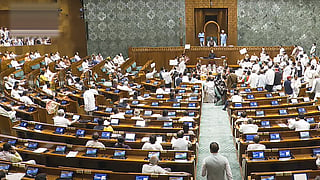India is likely to tap into its vast energy resources through domestic and foreign investments as the Lok Sabha passed the Oilfields (Regulation and Development) Amendment Bill on Wednesday.
Presenting the bill in the lower house of Parliament, Petroleum Minister Hardeep Singh Puri said the bill would ensure policy stability, international arbitration, extended lease periods for the Indian exploration and production sector.
The present global energy scenario and the hydrocarbon landscape has dramatically changed. Hence, there was a need to amend the act to reflect current realities, national priorities, promote ease of doing business, decriminalise provisions and align India's exploration and production framework with practices of competing geographies, according to Puri.
"By virtue of the fact that we are going to rely on conventional energy for some time, we need to step up our exploration and production activities. Today's successful passage of the bill will be a constructive and positive step in this direction," he posted on X.
Since 2014, India has made significant strides in its economic growth, rising from the 11th or 10th-largest economy globally to the fifth largest. It is projected to become the third-largest economy by 2027. A key driver of this growth is the country's increasing energy demands, with oil consumption currently standing at 5 million barrels per day.
With the current rate of economic growth, this consumption will rise to 6.5–7 million bpd soon. To meet these growing demands, the government has taken steps to open up previously inaccessible sedimentary basin areas for exploration, Puri said while presenting the bill in Lok Sabha.
In 2022, 99% of these "no-go" areas were opened up, resulting in 76% of all prospecting and exploration being conducted in these newly accessible regions. This move is expected to attract more foreign companies to participate in India's E&P sector, according to Puri.
He said several foreign companies, including Exxon, BP, Chevron, Total, and Eni, were now showing interest in India's E&P sector. Some of these companies, which had previously exited India, are now partnering with Indian oil marketing companies to explore new opportunities. For instance, Exxon has partnered with Oil & Natural Gas Corp. for the redevelopment of the Bassein and Mumbai High fields, while Brazil's Petrobras has partnered with Oil India Ltd. for exploration in the Andaman Sea.
The Oilfields (Regulation and Development) Amendment Bill, 2024, introduces several key reforms to facilitate growth in the E&P sector. These include:
Expanded definition of mineral oils: The bill broadens the definition to include naturally occurring hydrocarbons, coal bed methane, and shale gas/oil.
Single permit system: A streamlined permitting process for all types of mineral oil exploration, development, and production.
Clarity on mineral oils: The bill provides clarity on the term, promoting exploration and production of new fuel options.
Stability and predictability: The bill aims to provide stability and predictability for foreign investors, crucial for large-scale investments in the infrastructure sector.
Alternate dispute resolution: A fast and efficient dispute resolution mechanism to ensure timely and cost-effective resolution of disputes.
 RECOMMENDED FOR YOU
RECOMMENDED FOR YOU

Bihar Elections 2025: Decoding Ticket Distribution Muddle In NDA, Mahagathbandhan
 Oct 05, 2025
Oct 05, 2025

Parliament Monsoon Session Sees 26 Bills Passed In Lok Sabha And Rajya Sabha — Details Here
 Aug 21, 2025
Aug 21, 2025

Online Gaming Bill Proposing To Ban Money-Based Gaming Introduced In Lok Sabha
 Aug 20, 2025
Aug 20, 2025

Jan Vishwas Amendment Bill Tabled In Lok Sabha: List Of Offences Proposed To Be Decriminalised
 Aug 18, 2025
Aug 18, 2025


